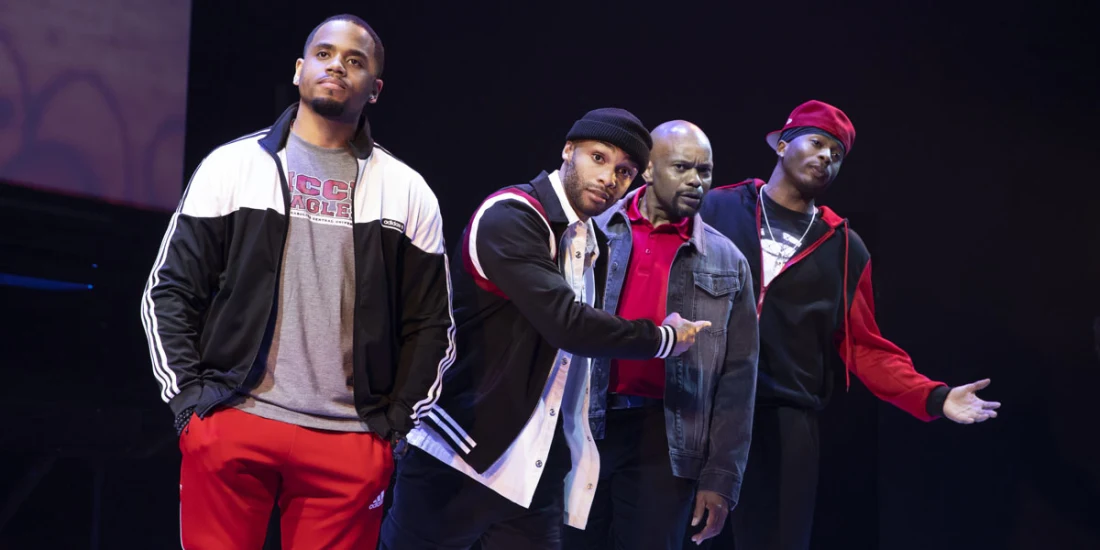'Thoughts of a Colored Man' review - timely new play shows the universe in Black men
Shakespeare once wrote, "What a piece of work is a man!" In that famous monologue from Hamlet, Shakespeare was writing about, in part, the varied beauty and contradictions within humanity. Granted, Shakespeare was talking about white men, who for centuries have been given the gift of being seen as fully formed human beings. Unfortunately, while this benefit was extended to white men, it has not been extended to Black men. That sense of humanity, virtues, and flaws in Black men is what Keenan Scott II's powerful new Broadway play, Thoughts of a Colored Man aims to portray.
Thoughts of a Colored Man follows seven different Black men as they go through their day in Brooklyn. These men may live in the same neighborhood but they each have individually compelling stories. There's Depression who had to defer his dreams in order to take care of his struggling family; there's Passion who was raised without a father and in need of guidance as he's about to become one; there's Happiness who is gay and well-to-do and trying to find community.
The other men are similarly named with different emotions (Wisdom, Love, Anger, Passion). What Scott and the cast skillfully portray is how each man is fully formed and contains multitudes: both tough and vulnerable, fearful of love yet deeply craving it.
Scott wrote Thoughts of a Colored Man as a response to the stereotypical ways that Black men are portrayed in the wider culture. So, in the play, every man has the space to convey his own thoughts to the audience, while also interacting with his fellow man. The set (by Robert Brill) is simple: a billboard with the word "colored" on it in all caps. Every time a scene changes, the billboard changes to a different projection (Sven Ortel), and the sound design (Mikaal Sulaiman) and lighting (Ryan O'Gara) give the audience a new sense of place. The design gives the play a mosaic quality: These individual monologues and dialogues add up to a whole portrait, one of the universal humanity within Black men.
A scene in the barbershop with all seven men conveys Scott's ability to write for different types of voices: the dialogue crackles and swerves, personalities and conflicts, and probing questions about gentrification and poverty are brought up. The production is also buoyed by the chemistry of the cast, and the different energies they each bring to their characters. One thing is made perfectly clear: the Black community, and Black men especially, are not a monolith.
Thoughts of a Colored Man borrows aspects of Ntozake Shange's For colored girls...., which was an expansive portrait of Black women. Both plays have similar allegorical naming conventions for its character and they are also performed in verse. Thoughts of a Colored Man uses slam poetry, spoken word, and song. That gives Thoughts of a Colored Man a lyrical beauty, with lines like, "If I knew that some of the kids I played, ran and jumped with would experience death before adulthood, I would've made sure I cherished those moments a little bit more," gorgeous in their construction and devastating in their specificity.
Within the play, Scott also touches on many hot-button culturally specific topics, including homophobia, class divides, fatherhood, and what being a man truly means. It's an overflowing basket of topics for one play; any of these threads could be a play by themselves, and hopefully they will be. As Thoughts of a Colored Man shows, Scott is able to skillfully write multiple differing viewpoints and his luscious prose should continue to be shared with audiences.
Yet in trying to create a look at Black men that goes beyond the stereotypical, Scott does fall into some of the same thematic conventions that are common in Black narratives.
For instance, when Thoughts of a Colored Man veers towards the tragic, it's understandable why that element is in the play — it represents a certain reality. Yet I wondered if that plot point also played into what audiences expect when they come to a show about Black men. It definitely played into mine, which is in itself indicative of what the wider culture has trained us to expect from Black narratives: sadness, death. In meeting the audience's expectations, Scott deviates from what he set out to do, which is to tell a narrative about Black men that is rarely told.
And in giving his character names rooted in emotions, Scott also makes them archetypes instead of humans. "All we wanted was to be ourselves, to live," says Depression (played by Forrest McClendon, a standout performance). What does a play about Black life look like when the characters aren't being a representation and are instead, just living?
Thoughts of a Colored Man won't provide that answer. At the same time, it is an important work for the current moment. Because as long as Black men are unjustly murdered by police officers and incarcerated with abandon, Thoughts of a Colored Man and what it aims to do will continue to be relevant and necessary.
Photo credit: Tristan Mack Wilds, Dyllón Burnside, Forrest McClendon and Da'Vinchi in Thoughts of a Colored Man (Photo by Julieta Cervantes)
Originally published on
